From left: Tim Hickman, Eugenia Kutsch-Stanton, Randy Mayer, John Schmacker, Elle Wyant, Dr. Kyle Christiason (ally)
Writer: Candace Ord Manroe
Photographer: Duane Tinkey
Now in their third year, dsm magazine’s LGBTQ Legacy Leader awards recognize the outstanding professional, personal and civic achievements of LGBTQ Iowans. Their contributions and advocacy work have made our state a better place for us all; indeed, even amid setbacks and discrimination, they have strived to make “Iowa nice” a reality and not a mere slogan. As in previous years, we’re also recognizing an ally of the LGBTQ community who has been a passionate and effective advocate for equality.
Read about the honorees below, and listen to what they have to say in a video created by Emily Blobaum, available below the story. The event to celebrate them will be virtual again this year; please join us on Oct. 15, from 11:30 a.m. to 1 p.m., to meet this year’s inspiring group of dynamic leaders.
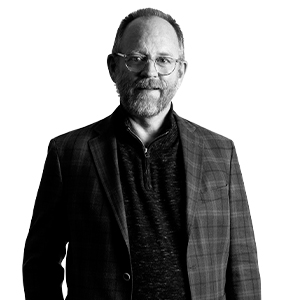
Tim Hickman
Tim Hickman
Artful Convictions
Des Moines architect Tim Hickman revealed the stuff he’s made of early in his career. In 1990, just five years after earning a bachelor’s degree in architecture from Iowa State University, he walked away from an internship in the field he loved to pursue a more urgent calling: The AIDS epidemic was raging, and as a proud gay man, he wanted to help. He worked for the Red Cross as an HIV/AIDS educator, volunteering for the Buddy Program.
“I wanted to be able to contribute more to the world than designing expensive houses,” says Hickman, who founded Substance Architecture in 2005.
In fact, he’s never stopped contributing. As an award-winning architect, most of his civic work revolves around arts and culture. Still, he’s never stopped advocating for LGBTQ equality, often alongside his husband, Frank Vaia, who’s retired. The two married in 2010, but have been in a relationship since 1988.
Hickman “daily acts on the values of equity, respect, nondiscrimination and inclusion,” says Dory Briles, executive director of the Des Moines Public Library Foundation, where Hickman served as board president in 2017-2018. “Through Tim and Frank’s open and strong relationship, they have created straight allies for LGBTQ issues.”
It wasn’t always easy to be proud. “The toughest part of growing up gay was that my young life centered on my Southern Baptist church in Ames,” the 58-year-old Hickman recalls. “The church was the center of my family and social life. Once I started to understand that I was gay, I felt trapped in a mindset that told me that only profoundly evil people could be gay and that being gay was a choice. That led to years of hiding and self-loathing.”
He adds that he may not be “naturally disposed to being empathetic, but my experience of being judged and shunned by parts of my religious community has allowed me to feel for anyone who is scorned for their difference.”
Hickman earned a master’s in architecture from Yale University in 2000. Earlier, he studied at the Ecoles d’Art Americaines in Fortainebleau, France. He worked at several Des Moines architecture firms before striking out on his own in 2005 with Substance Architecture.
Currently Hickman serves as president of the board of directors of the Greater Des Moines Public Art Foundation, a position he’s held since 2017, and is a docent at the Des Moines Art Center. His volunteerism also includes helping out AIA (American Institute of Architects) Iowa in a variety of ways, including previously serving as its professional development committee chair.
No matter the cause or project served by his volunteerism, Hickman continues to work for LGBTQ equality. His advice for LGBTQ youths—or for anyone, for that matter—is “to figure out the essence of who you are, beyond your emotions and your situation. If you can find that essence, and be true to it, you can give up worrying about everyone else’s judgement about you.
“If someone rejects you because you are gay, nonbinary or bisexual, or because of your fashion choices or tattoos or lisp, you can say: ‘That is their problem, not mine,’” he adds. “That can be very freeing, and will allow you the confidence required to accept and validate other people, which is what we are here to do.”
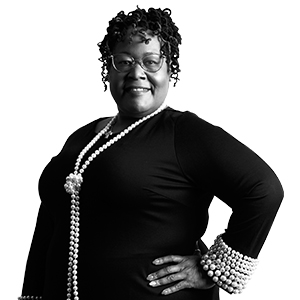
Eugenia Kutsch-Stanton
Natural-Born Activist
As COVID-19 pummeled Iowa industry, employees like Corteva Agriscience research scientist Eugenia Kutsch-Stanton fought back with MacGyver-esque resourcefulness. As part of the company’s crisis management team, she strategized how to keep communication flowing between employees working from home and workers in the field. “Plants continue to grow even in a pandemic,” Kutsch-Stanton wryly observes.
The St. Louis native was up for the task. Kutsch-Stanton knew that it’s imperative to clearly identify a problem before tackling its solution. Now 52, she’s spent a lifetime polishing both skills.
“I was born an activist,” says the daughter of a firefighter father—one of St. Louis’ first African Americans to serve in the capacity—and a mother who taught special education and later worked in school administration. “Our mom would take us to the firehouse where we would hang on our dad,” she recalls.
She also learned how to identify prejudice at her father’s firehouse: “Meals would be provided, but they resented feeding my dad. Once he was fed dog food.”
Kutsch-Stanton earned two master’s degrees—an MBA from the University of Iowa and an MS in biology from the University of Missouri—and an undergraduate degree in biology from Jackson State University in Jackson, Mississippi. She began her career as a research scientist at Monsanto before joining DuPont Pioneer. She currently works as the U.S. crop protection regulatory lead at Corteva, based in Johnston. What’s not in her job description is her behind-the-scenes advocacy for African Americans, women and LGBTQ people.
“My colleagues laugh, ‘Oh, no, here comes Eugenia with another growth opportunity,’” she says. “Stoking that fire in people that gets them to identify what they can do to make the world a better place for all of us is my goal. We’re all just making this up as we go along.”
Kutsch-Stanton’s community volunteerism is tireless and multifaceted. She’s a board member of the Greater Des Moines Leadership Institute, currently serving as chair-elect of its Equity and Inclusion Committee, of which she was a founding member. To hone her effectiveness as a leader, she graduated from the Greater Des Moines Leadership Institute’s Community Leadership Program. Under her tutelage, the Leadership Institute launched a racial equity educational program to increase awareness of systemic racism in Greater Des Moines. In addition, she’s an advisory council member of One Iowa’s inaugural LGBTQ Leadership Institute.
Donning another hat, Kutsch-Stanton volunteers to address the unmet needs of women and girls as a board member of the Chrysalis Foundation, for which she recently finished serving as board president. “She’s been instrumental in promoting the mission and vision of Chrysalis by advocating for the support of young women and recruiting new members,” says Bridget Cravens-Neely, who first met Kutsch-Stanton through their membership in the historically African American sorority Sigma Gamma Rho.
“Eugenia has been a strong advocate for the rights of the underrepresented and marginalized LGBTQ and African American communities,” Cravens-Neely adds. “Due to her intersectionality of these two groups Eugenia has [helped] build awareness and increase understanding around the issues that adversely affect both groups.”
Kutsch-Stanton, who is married to Sheri Kutsch-Stanton, advises LGBTQ youths as well as others to “spend time daily knowing and learning more about your authentic self. Be fabulously you. Identify your values, and let them guide your journey.”
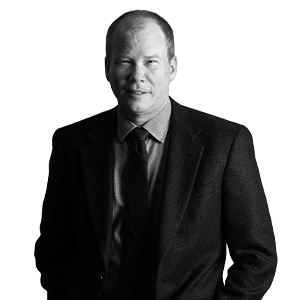
Randy Mayer
Public Servant
As a scientist, 56-year-old epidemiologist Randy Mayer is tasked with serving the state as the Iowa Department of Public Health’s bureau chief of HIV, STD and hepatitis. As a gay man, he brings understanding, dedication and compassion that go beyond the job description.
“Randy has always been a champion for HIV positive individuals who have fought to live with dignity and hope,” says Polk County Supervisor Matt McCoy. Quietly, Mayer has spent more than 20 years behind the scenes working to eradicate HIV in the state.
The results of his work are measurable: From 2016 to today, Iowa has shown a 30% decline in the number of individuals testing positive for the disease. “It’s a true reduction,” Mayer explains. “We’re testing more people, not less.”
The nature of Mayer’s job is one part science, one part sociology, and all parts communication. “Randy has a rare ability to communicate effectively with a wide range of stakeholders,” says colleague Holly Hanson. “He speaks [on the science] to laypersons without condescension and in terms they can easily understand.”
Hanson and other peers admire Mayer for his willingness to take a stand on tough issues even when doing so could jeopardize his career. “His combination of effective communication and doing what is right has enabled Randy to effect change not only in Iowa, but across the country,” Hanson says.
One such change is Iowa’s modernization of its 1998 HIV criminalization statute, which made failure to disclose one’s HIV-positive status to a sexual partner a class B felony punishable by up to 25 years in prison. In 2014, that law was repealed and replaced with one that reflected the latest scientific understanding of how HIV is transmitted; it’s viewed as more humane and less socially stigmatizing. The update not only has served as a template for other states, but even for other countries.
A San Antonio native, Mayer relocated to Iowa with his family before graduating from high school. He earned a bachelor’s degree from Iowa State University in botany. Next, he received a master’s in horticulture from Purdue University, where he met his husband, Bill Graves, a trained botanist and dean of the graduate school at Iowa State. The couple married in California in 2008, before same-sex marriage was legal in Iowa, but they have been together 35 years.
After marrying, they relocated to teach at the University of Maryland. While there, Mayer volunteered for a program at a health clinic, where he was paired to provide social support to someone with HIV. That man suggested that Mayer’s true calling might be epidemiology.
He was right. Mayer went back to school for his second master’s, this time earning a Master of Public Health degree in epidemiology from the University of Minnesota. After positions at Iowa State University and at the Iowa Department of Public Health as the state’s chief HIV epidemiologist, he moved in 2008 into his current position as bureau chief, overseeing a staff of 40.
“My advice to younger people is to be yourself and to surround yourself with people who believe in you,” Mayer says. “Any struggles that I might have faced were eased by having someone who has always believed in me fully. Together we created the life that we wanted to have despite pressure from society to make us feel less than whole.”
He urges gay and trans youths not to believe that anything is wrong with them but rather “with those causing their pain. I would tell them to find their supporters and allies, and do their best to get away from the rest.”
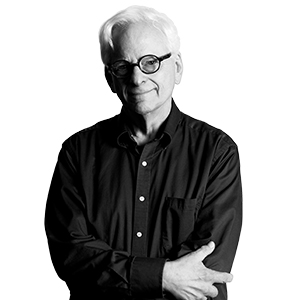
John Schmacker
Strong Shoulders
LGBTQ rights that some Gen Zs and millennials may take for granted didn’t emerge from a vacuum. They began with trailblazing activists like Des Moines native John Schmacker. Every time an LGBTQ person’s sexual orientation is protected in the city of Des Moines, Schmacker is the person to thank.
In the late 1990s, then-Mayor Preston Daniels appointed Schmacker, now 78, to the Des Moines Human Rights Commission. He successfully led the effort to expand the city’s protected rights to a broader ordinance that included sexual preference.
“It’s true that younger members of the LGBTQ community don’t always realize they’re riding on someone else’s shoulders every time they walk down the sidewalk holding hands or gather outside a gay bar without fear of being spit upon,” Schmacker reflects.
Things weren’t so easy for him growing up. “The hard part was not coming out to my family. It’s hard work staying in the closet,” he says. Before the Stonewall uprising in New York’s Greenwich Village on June 28, 1969, “you were either in the closet or ‘known.’ There was no ‘out’ before then,” he explains.
During the AIDS epidemic, he served on the Governor’s Task Force on AIDS, starting with its creation in 1987 by then-Gov. Robert Ray. The goal was to help Iowa develop an appropriate, compassionate response to the crisis. He also has served as president of the Gay Coalition of Des Moines and as president of the Gay and Lesbian Resource Center. His many contributions to advancing LGBTQ equality include serving on the boards of the Iowa Pride Network, the Iowa Pride Center and the Des Moines Gay Men’s Chorus.
In fact, Schmacker founded the chorus. “I was noticing gay men’s choral groups forming in other cities, so I got a group from Des Moines together around the piano in my basement. That’s where it started,” he says with a laugh.
That was in the early 1980s. “At the time, the other members sadly did not want ‘gay’ in the name of the group,” he recalls. After the choral group’s first iteration dissolved, Schmacker relaunched the organization, this time with “gay” proudly in its name. It’s celebrating its 20th anniversary this year.
A CPA and graduate of Iowa State University, Schmacker began his career in accounting and finance after the Navy, where he served during the Vietnam War aboard an aircraft carrier in the Gulf of Tonkin. He visited his first gay bar while drydocked in San Francisco on June 28, 1969—the same day as the Stonewall riots in New York City. He associates that infamous day with his coming out, though it would be later, in the late ’70s, in Iowa. “It still wasn’t safe to be out in Iowa in the 1970s,” he says.
His professional life includes having worked as a senior financial consultant for the American Red Cross, the chief financial officer for the Iowa chapter of the Red Cross, and controller for the Iowa Democratic Party. He’s also offered his expertise pro bono, serving as treasurer of several nonprofits.
But he views his teaching experiences as his greatest accomplishments. He was a frequent speaker to college students and to Iowa classroom teachers and principals and also led marriage equality debates at Drake University and at Buena Vista University in Storm Lake.
Even though some of those teaching experiences were 20 years ago, Schmacker was thanked as recently as this summer by someone who’d been in attendance.
“We change people’s minds one brain at a time,” Schmacker says. “Even with as much progress as we’ve made, we are always one vote and one Supreme Court decision away from having our rights taken away from us.”
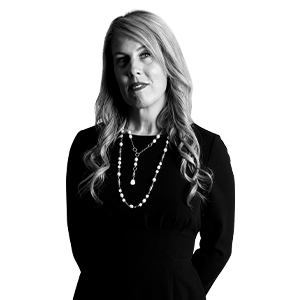
Elle Wyant
Living Her Truth
Kids know “be yourself” as the parental panacea used to settle nerves from the first day of school to the first date. For LGBTQ activist Elle Wyant—who began her transition from male to female in 2009, officially came out to her friends, family and colleagues in 2010, and had gender confirmation surgery in 2012—the advice remains spot-on. By living her truth, an act of courage and gravitas, Wyant supports individuals grappling with gender identity without having to say a word.
“I hope that by owning who I am I can be a role model to people in the community,” says Wyant, who lives in Marengo in eastern Iowa.
And what a role model that is, according to Vanessa M. Blanchfield, assistant general counsel in Wells Fargo’s legal department in Des Moines. “Elle is full of positivity and possibility,” says Blanchfield, a friend of 20 years. “She is the most fearless person I know.”
Wyant’s decision to transition included careful consideration for the feelings of her two daughters, now 13 and 14, whom she has with her ex-wife. “It’s best that children grow up knowing they have two parents who are happy,” Wyant says.
“You have to love yourself before you can love others, and I wanted the best for my children,” she adds. “The only way I could give them that was to love myself.” (This Father’s Day, her younger child presented her with a handmade card embellished with drawings of flowers and butterflies. A handwritten note that runs the length of a page says, among other things, “You mean the WORLD to me. … I love you beyond imagination.”)
The 45-year-old Wyant, an Iowa State University communications graduate, is beginning her 19th year as an account executive with UPS. Chairwoman of the company’s LGBTQ Business Resource Group, she’s helped the Iowa City organization grow from 30 to 130 members, making it the company’s largest group in the country except for the home office in Atlanta.
Her volunteerism extends to a variety of LGBTQ events, whether she’s behind the podium speaking or behind the scenes organizing. She attributes her outgoing nature and willingness to serve to having grown up in a family of extroverts. Her family owns two Iowa wineries: Ackerman Wine in the Amana Colonies and Fireside Wine—the state’s largest—in Marengo, where Wyant grew up.
She lives in a circa-1950 home, but she uses a 151-year-old restored one-room schoolhouse on the property for LGBTQ events. When a young person thinking of transitioning asked Wyant to appear with her on MTV, she agreed. The MTV camera crew flew to Iowa and shot the segment inside the old schoolhouse.
“When I was growing up, I didn’t know a single person in the LGBTQ scene,” Wyant says. “I had no one to mentor me. So whenever I can help someone else, I do.”
There was so little LGBTQ visibility in her town while she was growing up that Wyant learned about gender identity in a college library. “I didn’t know what I was feeling until I found the right book.” But once she knew, she was open about it when dating her future wife. When her wife filed for divorce, Wyant realized it was time to embrace making the transition.
Wyant recently met a girl “transitioning to her authentic life. I told her to hold her head high; to educate herself and others [on what it means to be transgender], and to not be afraid of what the world thinks,” she says. “You deserve to be happy. Live authentically, and the right people will come to you.”
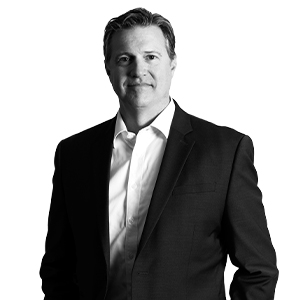
Ally Award
Dr. Kyle Christiason
Health Innovator
Like many who stand with the LGBTQ community, this year’s Ally honoree, Waterloo family physician Kyle Christiason, 51, deepened his commitment from support to activism when things got personal—specifically when his then-teenage son, Ben, now 24, announced he identified as transmasculine.
Christiason and his wife, Jennifer, began a “complex and cumbersome journey navigating the health care system. They quickly realized the gaps and lack of services available for Ben and others like him,” says Dave Williams, M.D., the CEO of the UnityPoint Clinic where Christiason practices.
What the family’s research revealed were two uncomfortable truths: that 1 in 4 transgender people have had a negative health care experience and, more alarmingly that 1 in 5 have been refused care for no other reason than being transgender.
Christiason resolved to change that narrative. His idea was to provide a specialized health care facility for LGBTQ people. The clinic dedicated to LGBTQ care opened in 2018 as the UnityPoint Health Prairie Parkway LGBTQ+ clinic in Waterloo, an extension of the existing clinic where Christiason practiced. The specialized care services are open two days a month during extended hours from 5 to 7 p.m., when Christiason and another provider trained for LGBTQ patients offer care services.
“Its care teams are trained to nurture trust, learn terminology, understand concepts and identify available resources in order to appreciate the unique challenges and incredible resiliency of the LGBTQ community,” Williams says.
The clinic provides primary care and routine exams, vaccinations, cancer screening, contraceptive management, and STI testing and treatment, among other services. Under Christiason’s leadership, the clinic was an immediate success—so much so that another clinic for similar services was opened using Christiason’s as a prototype, this time in Central Iowa: In 2019, UnityPoint Health LGBTQ clinic opened in Des Moines.
The Waterloo clinic has been recognized by the American Board of Internal Medicine Foundation’s Trust Challenge. The clinic also has received commendation from JAMA, the American Journal of Managed Care, Modern Heathcare, and Health Affairs. Christiason serves as the inaugural chair of the UnityPoint Clinic/UnityPoint at Home board of directors and is CEO for UnityPoint Accountable Care, one of the largest ACOs in the nation.
Christiason’s advice to parents with children exploring their gender truth is to “realize that what you may feel as personal grief is contrary to what your child is feeling. Your child, for the first time, can feel joyful. It’s like a new birth. So please don’t feel compelled to bring your doubts, fears, grief, guilt or any other of your issues to your child. Those are your issues, and this is your child’s journey.”











